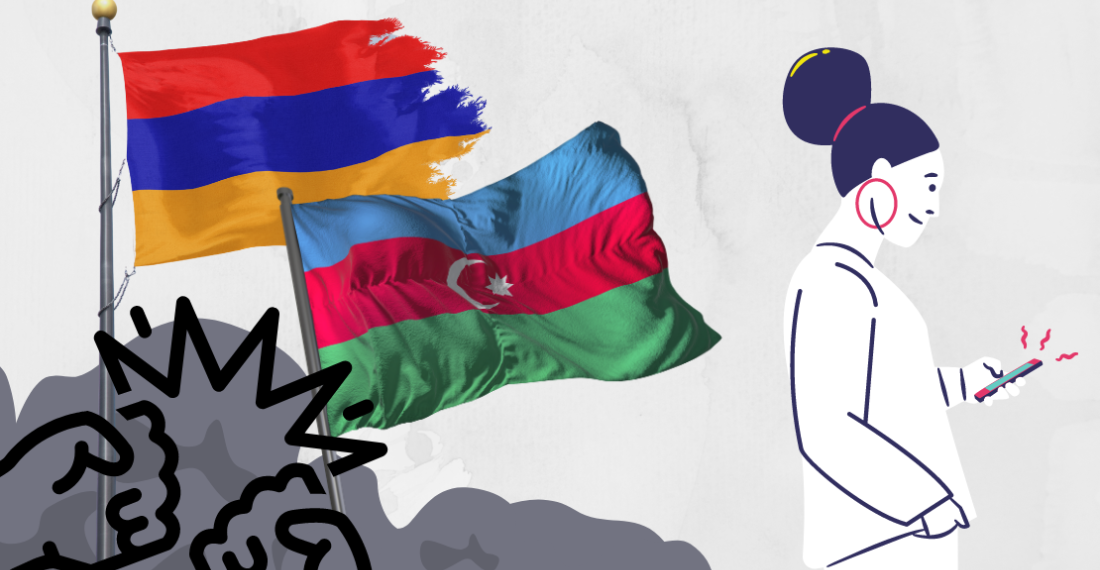"Today, the media in both Armenia and Azerbaijan, and also among those niche market publications based abroad that report on the region, amplify the negative and nearly always ignore any positive developments or glimmers of hope," writes Onnik James Krikorian in this op-ed for commonspace.eu. "The masses in both countries have already turned off from such coverage. And trust in the media is now at an all-time low, especially given the extent of inaccurate reporting during the 2020 Karabakh war."
"Without more accurate and unbiased information […] free of negative rhetoric and stereotypes, Armenians and Azerbaijanis will continue to see themselves as enemies without any common ground," a 2008 report from the Caucasus Research Resource Centres (CRRC) read.
"Some argue that those with a strong interest in politics and access to various sources of information are subject to ‘biased processing,’" the CRRC report continued, explaining that people tend to filter information based on already existing views even if they otherwise say they would prefer a more unbiased media.
Regrettably, even after fifteen years, the situation remains largely unchanged. Despite a more diverse information space that includes a plethora of niche outlets funded by international donors, many have now proven themselves more partisan and nationalist than the traditional media to which they were meant to provide an alternative. There are some exceptions, of course, but these are few and far between in the scheme of things and anyway reach a small audience.
Indeed, confirmation bias continues to remain a significant problem with those Armenians and Azerbaijanis eager for information instead seeking out news and commentary that reinforces biases and stereotypes rather than challenging them. Today, the media in both Armenia and Azerbaijan, and also among those niche market publications based abroad that report on the region, amplify the negative and nearly always ignore any positive developments or glimmers of hope.
The masses in both countries have already turned off from such coverage. And trust in the media is now at an all-time low, especially given the extent of inaccurate reporting during the 2020 Karabakh war.
To be fair, the situation resembles that which emerged in established democracies such as the United Kingdom and United States from 2016 onwards. Both the Brexit referendum in the UK and the Trump presidency in the US gave rise to polarisation on an unprecedented scale with the negative exponentially amplified in just seconds on social networks. Both demonstrated how media and digital literacy skills mean little when others manipulate the deepest fears of the audience.
The advent of social media has also exacerbated the situation. Platforms like Facebook, Telegram, WhatsApp, and TikTok have intensified polarisation among conflicting sides, internally and externally, and have even managed to monetise emotions, with anger being the most potent and effective of all. This trend now drives online engagement and has resulted in a surge of clickbait headlines, even from reputable media outlets compelled to now compete in this environment.
But that’s not how it should be.
The media does have a crucial role to act as a bridge, bringing to light the realities and complexities of the conflict rather than fanning the flames that started or reignited it. Unbiased and accurate reporting should instead highlight the root causes of conflict from all sides as well as potential solutions no matter how unpalatable for some. It is essential to present a diverse range of opinions, avoiding cherry-picking only those viewpoints that align solely with maximalist positions.
Sadly, however, that is not the situation today. What mainly exists instead, with few exceptions, is partisan and activist journalism that often resembles an evolved form of politicised blogging. Such an approach is counter-productive and arguably dangerous, especially when it comes from those journalists that can hardly remember the war of the 1990s or the failed mediation process until 2011 when the descent towards war arguably accelerated.
And even when some media outlets or journalists do attempt to demonstrate the nuanced nature of conflicts, presenting the opinions and grievances of both sides, or merely use internationally recognised toponyms, they then face unwavering and coordinated attacks from a virtual army of trolls already poised ready to pounce. These targeted campaigns are fixated on censoring, cancelling, or discrediting anything they disagree with or don’t want discussed, no matter how relevant.
Consequently, the media space descends into chaos, leaving the public confused, open to manipulation, or simply apathetic. Suffice to say, it shouldn’t be like that.
Which reminds me.
Ten years ago, a seasoned foreign journalist was imparting knowledge to a group of young Armenian, Azerbaijani, and Georgian journalists in Tbilisi, focusing on conflict-sensitive reporting. He assigned them the task of preparing an objective report on a conflict between "Country A" and "Country B." The scenario seemed straightforward enough as the warring sides were neutrally named to avoid any possible sensitivities.
During the class, one student raised her hand.
"Which country am I?," she asked, as if that should dictate coverage.
And therein lies the problem.
source: Onnik James Krikorian is a journalist, photojournalist, and consultant from the U.K. who has covered the Armenia-Azerbaijan conflict since 1994.
photo: Fourth Estate
The views expressed in opinion pieces and commentaries do not necessarily reflect the position of commonspace.eu or its partners







